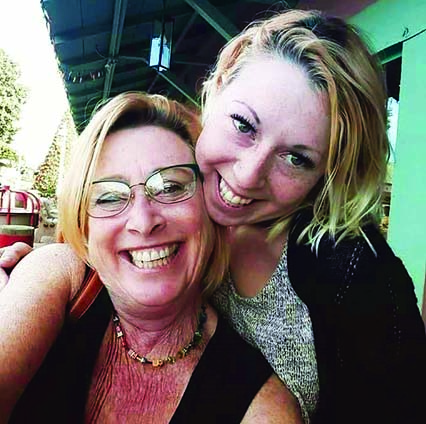By Mercy Care Staff It’s a warm mid-October day when Gabriel Maytorena takes his place in front of an imposing television camera that would intimidate most people. But, Gabriel just...
By Mercy Care Staff
It’s a warm mid-October day when Gabriel Maytorena takes his place in front of an imposing television camera that would intimidate most people. But, Gabriel just smiles calmly. The cameraman from Telemundo, one of the Valley’s Spanish-language television news stations, adjusts the camera to just the right angle. He tests the microphone to make sure it captures Gabriel’s every word. Then, as the camera starts rolling, he asks Gabriel about his experience living with mental health disorders.
Gabriel explains how he felt when he was first diagnosed with bipolar disorder, anxiety, depression and schizophrenia at the age of 12.
It was overwhelming. Confusing. Uncertainty about the future washed over him.
He talks to the cameraman about how he copes with his mental illnesses. And, he talks about why it’s important for others to also share their stories.
“I first realized how important it was to share my story when I was introduced to a community of my peers,” Gabriel said. “Instead of being cautious of me, they welcomed me whole-heartedly into the community.”
One of the young men in the community that Gabriel joined at that time had just died by suicide. He realized early on how stigma around mental illness can contribute to those types of outcomes.
To those people who may harbor shame about their mental illness, Gabriel encourages them to instead fight the stigma.
If they don’t fight stigma then “the battle is already lost,” he said.
“It’s going take as many individuals as the community can muster, at their full potential, to get close to getting rid of stigma,” Gabriel said. “Every action, every thought, every person matters.”
Being involved, fighting stigma is part of Gabriel’s mission.
He’s a member of various leadership and advisory groups, including Mercy Care’s Youth Leadership Council. He’s talked to lawmakers about the importance of continuing to fund behavioral health programs. And, he’s working on developing leadership training events for other youth experiencing mental health problems as a way to fight stigma.
Stigma: What is it and how can it hurt people?
The National Alliance on Mental Illness (NAMI), the grassroots mental health organization dedicated to improving the lives of the millions of Americans affected by mental illness, describes stigma this way:
“Stigma is when someone, or even you yourself, views a person in a negative way just because they have a mental health condition. Some people describe stigma as a feeling of shame or judgement from someone else. Stigma can even come from an internal place, confusing feeling bad with being bad.”
Navigating life with a mental health condition can be tough, and the isolation, blame and secrecy that is often encouraged by stigma can create huge challenges to reaching out, getting needed support and living well.”
NAMI’s website offers some insight into the damaging effect of stigma, and how we can learn to avoid and address stigma. Here are some of stigma’s effects:
People experiencing mental health conditions often face rejection, bullying and discrimination. This can make their journey to recovery longer and more difficult.
Mental health conditions are the leading cause of disability across the United States.
Even though most people can be successfully treated, less than half of the adults in the U.S. who need services and treatment get the help they need.
The average delay between the onset of symptoms and intervention is 8-10 years.
Suicide is the second leading cause of death of youth ages 15-24 and the tenth leading cause of death for all Americans.
Stigma and suicide
Mercy Care and its employees are committed to fighting stigma. We sponsor and participate in many community events to raise awareness about mental health and stigma, including the NAMI Valley Walk, Mental Health Night with the Phoenix Mercury and the Art of Recovery Expo. We participate in ongoing training, such as Mental Health First Aid and suicide awareness training called safeTalk.
And we support suicide prevention efforts through training and partnership with community organizations.
Heather L. Brown, Mercy Care’s Prevention Administrator, works to raise awareness about the intersection of suicide and stigma.
There is so much stigma out there about talking about mental health in general. But, then, consider suicide, which is especially hard to discuss, based on cultural, religious, and societal views.
“Part of the work we do in raising awareness about the public health issue of suicide is encouraging people to talk more openly and honestly about suicide, because it’s the best way to ensure they will get help when they need it,” she said.
She knows there are so many people that want to help, but may not know what to say or do.
“Stigma unfortunately prevents us from helping sometimes because we are worried about the consequences of talking about suicide. For the person who’s thinking about it, they are not sure who they can trust to take them seriously, who will not judge them for what they are thinking about, and most importantly, who will help them,” she said.
She noted that sometimes the people who want to help avoid asking about suicide because they think they’re going to give someone the idea, or say the wrong thing, or that it’s none of their business.
“Ultimately, we have to risk being helpfully nosey and asking the direct question in order to save lives,” she said. “Using the word “suicide” takes away its stigma, and lets persons with thoughts of suicide know that you are someone who cares and who takes things seriously. People who are thinking about suicide are often suffering in silence, and often don’t get the help they need. It’s time we all make a commitment to make suicide prevention our business.”
Stigma: How can we fight it?
All of us in the mental health community need to raise our voices against stigma. Every day, in every possible way, we need to stand up to stigma.
If you’re not sure how, here are nine ways NAMI’s Facebook community responded to the question: “How do you fight stigma?”
Talk Openly About Mental Health
“I fight stigma by talking about what it is like to have bipolar disorder and PTSD on Facebook. Even if this helps just one person, it is worth it for me.” – Angela Christie Roach Taylor
Educate Yourself and Others
“I take every opportunity to educate people and share my personal story and struggles with mental illness. It doesn’t matter where I am, if I over hear a conversation or a rude remark being made about mental illness, or anything regarding a similar subject, I always try to use that as a learning opportunity and gently intervene and kindly express how this makes me feel, and how we need to stop this because it only adds to the stigma.” – Sara Bean
Be Conscious of Language
“I fight stigma by reminding people that their language matters. It is so easy to refrain from using mental health conditions as adjectives and in my experience, most people are willing to replace their usage of it with something else if I explain why their language is problematic.” – Helmi Henkin
Encourage Equality Between Physical and Mental Illness
“I find that when people understand the true facts of what a mental illness is, being a disease, they think twice about making comments. I also remind them that they wouldn’t make fun of someone with diabetes, heart disease or cancer.” – Megan Dotson
Show Compassion for Those with Mental Illness
“I offer free hugs to people living outdoors, and sit right there and talk with them about their lives. I do this in public, and model compassion for others. Since so many of our homeless population are also struggling with mental illness, the simple act of showing affection can make their day but also remind passersby of something so easily forgotten: the humanity of those who are suffering.” – Rachel Wagner
Choose Empowerment over Shame
“I fight stigma by choosing to live an empowered life. To me, that means owning my life and my story and refusing to allow others to dictate how I view myself or how I feel about myself.” – Val Fletcher
Be Honest About Treatment
“I fight stigma by saying that I see a therapist and a psychiatrist. Why can people say they have an appointment with their primary care doctor without fear of being judged, but this lack of fear does not apply when it comes to mental health professionals?” – Ysabel Garcia
Let the Media Know When They’re Stigmatizing
“If I watch a program on TV that has any negative comments, story lines or characters with a mental illness, I write to the broadcasting company and to the program itself. If Facebook has any stories where people make ignorant comments about mental health, then I write back and fill them in on my son’s journey with schizoaffective disorder.” – Kathy Smith
Don’t Harbor Self-Stigma
“I fight stigma by not having stigma for myself—not hiding from this world in shame, but being a productive member of society. I volunteer at church, have friends, and I’m a peer mentor and a mom. I take my treatment seriously. I’m purpose driven and want to show others they can live a meaningful life even while battling [mental illness].” – Jamie Brown
Read the full blog at https://www.nami.org/Blogs/NAMI-Blog/October-2017/9-Ways-to-Fight-Mental-Health-Stigma
Resources
Mercy Care Complete Care Member Services representatives are available to help you Monday through Friday, 7 a.m. to 6 p.m. Just call 602-263-3000 or toll-free 1-800-624-3879 (TTY/TDD 711).
Mercy Care RBHA Member
Services at 602-586-1841, toll-free at 1-800-564-5465 or (TTY/TDD) 711. Representatives are available 24 hours a day, 7 days a week.
National Alliance on Mental Illness | www.nami.org
Check out NAMI’s Cure Stigma Campaign at www.curestigma.org
Mental Health America | www.mentalhealthamerica.net
Suicide Prevention Lifeline | www.suicidepreventionlifeline.org
American Association of Suicidology | www.suicidology.org/
Behavioral Health Crisis Line 602-222-9444


































